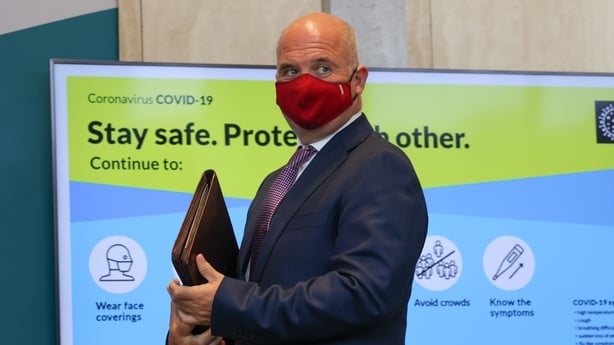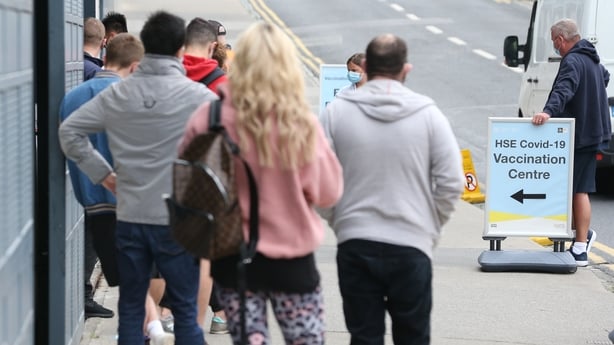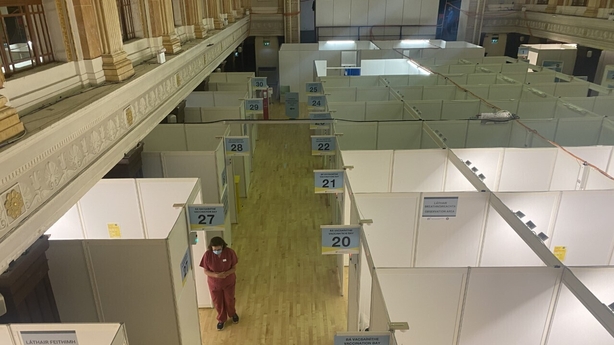The peak of the Delta variant wave has not yet been reached, according to Taoiseach Micheál Martin, while today's Covid-19 figures are the highest they have been since mid-February.
The Department of Health has been notified of 2,125 new cases, with 259 patients in hospital, an increase of eight on yesterday.
The number of people in ICU is up two to 54.
It comes as 1,612 new Covid cases were reported in Northern Ireland in the last 24 hours, with four additional deaths.
Speaking in Cork this evening, Mr Martin said although the Government had anticipated the rise in Covid numbers, he is concerned about the increase and asked people to remain vigilant.
Taoiseach Micheál Martin said the Government had anticipated the increase in Covid cases, adding that the peak of the Delta wave has not yet been reached. He asked people to remain vigilant | Read more: https://t.co/kfsC9dojgQ pic.twitter.com/vOLvGHREmG
— RTÉ News (@rtenews) August 21, 2021
"Anytime the virus is increasing at this rate is a time of concern, so I would appeal to people to watch the fundamentals in terms of social distancing, wearing masks indoors in particular and adhering to the basic guidelines."
Highest since February
Chief Medical Officer Dr Tony Holohan has urged all those who are not yet vaccinated to come forward and get their first jab.
The number of newly confirmed #COVID19 cases in hospital in the last 24 hours has reached a level not seen since mid-February.
— Dr Tony Holohan (@CMOIreland) August 21, 2021
This upward trend in serious infection is of significant concern, increasing the pressure on frontline healthcare services and non-COVID care.
"This upward trend in serious infection is of significant concern, increasing the pressure on frontline healthcare services and non-Covid care," Dr Holohan wrote on Twitter.
"I would urge those who are unvaccinated to come forward for vaccination as soon as possible and to take all recommended doses to limit your risk of severe infection. It is critical for everyone to stay safe by following the public health advice as part of their daily routine."
Meanwhile, Professor Philip Nolan, who is the Chair of the NPHET Epidemiological Modelling Advisory Group, said vaccines need to be given time to work.

"We have seen extraordinary uptake of vaccination in Ireland, and this is making us safer, but we need to give the vaccines time to work. The message: get your vaccine, get your second dose, and wait the 7-14 days they need to build your immunity," he also wrote on Twitter.
"Yes, over 90% of adults have had their first dose, and over 80% have completed their vaccination regimen, but only about 75% of adults are two weeks after their final dose; 25% of the adult population not yet fully vaccinated is enough for a large wave of disease.
"We are seeing continued growth in incidence, numbers in hospital and ICU.
"The cases are predominantly in young unvaccinated or partially vaccinated adults," Prof Nolan added.
"This very high incidence constitutes a large force of infection so that incidence is now rising in older vaccinated adults and in children.
"We should see incidence stabilise as the current vaccination programme finishes and these vaccines take full effect through August and into September, but the trajectory between now and then is uncertain and requires we minimise the risks of any social contact.
"Support those around you to get and complete their vaccination, and to wait 1-2 weeks for it to become effective. Stay safe with the basics: self-isolate if symptomatic, respiratory & hand hygiene, keep your distance, masks, avoid crowds, ventilation. "
Meanwhile, the CEO of the Health Service Executive has urged people not to dismiss public health advice, adding that if adults decide not to be vaccinated against Covid-19, they are putting themselves and others at high risk.
In an update on social media this morning, Paul Reid said it was "never too late" for people to get a vaccine.
"You may decide to ignore strong advice today from many of the top medics in the country. But please don't dismiss it," he said.
"If, as an adult, you decide not to be vaccinated, you do put yourself and others at much higher risk.
"We won't leave anyone behind and it's never too late."
You may decide to ignore strong advice today from many of the top medics in the country. But please don't dismiss it. If, as an adult, you decide not to be vaccinated, you do put yourself and others at much higher risk. We won't leave anyone behind & it's never too late.@HSELive
— Paul Reid (@paulreiddublin) August 21, 2021
Walk-in clinics open
Further walk-in Covid-19 vaccination clinics are open this weekend, as the country's immunisation programme enters its final phase.
People may receive either their first or second dose of the Pfizer-BioNTech or Moderna Covid-19 vaccines.
People will only be eligible to receive a second dose of the same vaccine they previously received.

To attend one of the walk-in clinics without registering online in advance, people must provide their Eircode, mobile phone number, email address and a form of photo identification, such as passport, driving licence or garda age card.
If those attending have a PPS number, this too should be provided.
Details of the locations of the clinics and opening times can be found here, or on the HSE website.
Currently, 84% of adults are now fully vaccinated, while 90% have received at least one dose.
Read more:
At a glance: The walk-in clinics open for first and second jabs this weekend
Latest Covid-19 stories
'Final big push' in Cork
The vaccination centre at Cork's City Hall administered its 150,000th dose of Covid vaccine today.
It first opened on Good Friday, 2 April.
Open from 1pm for walk-ins, staff said they were busier than expected with 150 people, mainly younger people, who were seeking first and second doses in the first hour.
The vaccination clinic will open again tomorrow for walk-ins from 11am to 2pm.

Noreen O'Leary, Lead Co-ordinator in the City Hall Vaccination Centre, urged people who have not yet been vaccinated to visit them and if they have questions or doubts to come and talk to staff.
"The pandemic is far from over. We can see daily numbers rising. I would say to anyone who is hesitant that there are walk in centres all over the country. Come and talk with us," she said.
"If you have any problems registering don't let that be an impediment. We will sort that out for you when you arrive.
"I would encourage anybody who is hesitant to come speak with us, speak with our doctors and get as much advice as possible so that you can make an informed choice about whether or not you get the vaccine."
Ms O'Leary said that Cork's City Hall will remain open as a vaccination centre until possibly October, but this weekend is the final big push.
The "Big Jab Weekend" will be the last chance for people to avail of their first dose at several regional mass vaccination centres.
Additional reporting: Jennie O'Sullivan
